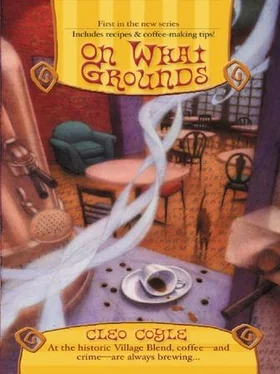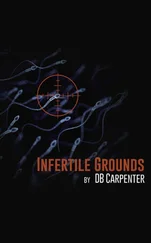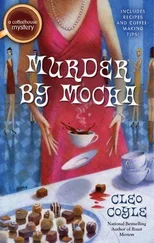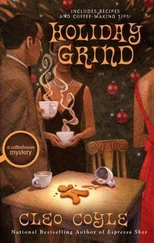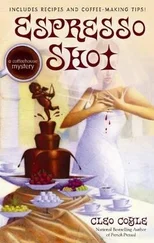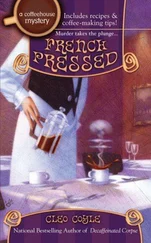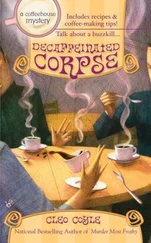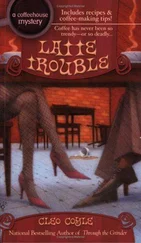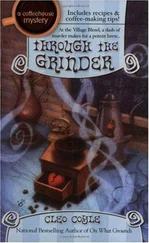Cleo Coyle On What Grounds
The author wishes to convey sincerest thanks to her excellent editor, Martha Bushko, and her exemplary agent, John Talbot, for having faith in this brew.
“I have measured out my life with coffee spoons.”
—T. S. ELIOT, The Love Song of J. Alfred Prufrock
She was a dancer. Young, slender, pretty, but not particularly beautiful. And not special.
From the corner of Hudson Street, the stalker watched her prancing about behind the tall French doors, sweeping, mopping, wiping—the gleaming wood floor, the marble-topped tables, and the silver espresso machine.
The hour was late. The place was closed, but the coffeehouse lights beyond the tall clear windows shone with a disturbing intensity, harsh beacons that burned through the thin layer of fog rolling in off the cold, dismal river just a few blocks away.
With tentative movements, the stalker followed those beacons, descending the curb into the empty street. Wisps of pale mist flowed in waves across the gray cobblestones, sweeping the stalker along in its ethereal current like some passenger on a ferryboat bound for the underworld.
Reaching the other side, the stalker moved onto the wide, clean sidewalk. From above, a faux gaslamp buzzed and sputtered. How appropriate, thought the stalker, and how typical. The vile little streetlight had the façade of class, but inside it was fake—the forced flickering of a cheap electric light, an inferior imitation of the real thing—
Just like Anabelle.
Nothing special.
The four-story red brick townhouse that held the coffeehouse was no different, the stalker decided. Just one of many in this historic area. Common. Ordinary.
Below the arched front window, an antique wrought-iron bench sat bolted to the sidewalk. Seeing it, the stalker sank to its cold, hard surface.
Breathing became difficult. No longer unconscious but an intentional thing. Purposeful, planned, and premeditated—
IN THEN OUT.
OUT THEN IN.
Deliberate counts. Deliberate breaths. Wave after wave until finally the stalker rose and once again made an approach.
The Village Blend’s door loomed large. Beveled glass in an oak wood frame. Pulsing music leaked through. The intense aroma of roasting coffee.
The stalker’s knuckles rapped: One knock. Two.
Inside, Anabelle spun. A dancer’s turn. The long, blond ponytail swung around the slender neck. Blue eyes widened in the oval face. The pert nose wrinkled; delicate eyebrows drew together, forcing unflattering folds into the high smooth forehead.
When she aged, that’s what she’d look like, thought the stalker. Shriveled and wrinkled and used up—
It was only a matter of years.
Surprise registered on Anabelle’s face as she stared at the figure beyond the glass. Slight suspicion was evident, but not alarm, and not panic.
Good, thought the stalker. Very good.
It took a week for Anabelle to cross the wood-plank floor. A day for her to click-clock the dead bolt. Finally, the framed beveled glass cracked, and the stalker stiffened, swallowing down the upsurge of bile.
THIS GIRL HAS IT COMING.
SHE’S BROUGHT IT ON HERSELF.
For days these thoughts had been repeated and repeated on breath after breath, in wave after wave. An unrelenting force, they became the current that carried away any last surge of sentiment, of creeping conscience, of warning whisper that one day there might be regret.
“Hello?” said Anabelle, warily. “I didn’t expect to see you.”
THIS GIRL HAS IT COMING.
SHE’S BROUGHT IT ON HERSELF.
“Do you want to come in?”
The stalker nodded, forced a smile. Then Anabelle cracked the door wider, the music pulsed louder, and the stalker strode in, vowing—at least for this one brief moment—never to look back.
The perfect cup of coffee is a mystifying thing.
To many of my customers, the entire process seems like some sort of alchemy they dare not try at home.
If the beans are Robusta rather than Arabica, the roasting time too long or short, the filtering water too hot or cold, the grinds too finely or coarsely milled, the brew allowed to sit too long—any of it can harm the end product. Vigilance is what gets you that perfect cup—vigilance and stubbornness in protecting the quality.
As the 1902 coffee almanac put it, “When coffee is bad it is the wickedest thing in town; when good, the most glorious.”
Of course, seeking that perfect cup of coffee is not without risks. For instance, after you’ve found it, and then gotten yourself addicted to drinking it, you’ve made yourself vulnerable. Because, on those rare mornings when you are prevented from getting it—well, to put it as indelicately as my ex-husband might—
You’re screwed.
I was in that very position the morning I’d found Anabelle’s body.
Trapped behind the wheel of my ten-year-old Honda, I’d been in traffic for, oh, about three months, and my one little espresso at 6 A.M. had worn off hours ago. With the freeway rest stops offering their standard range of brews—from weak as warm dishwater to bitterly burnt—I began to practice a sort of Zen caffeine visualization exercise.
All the way across Jersey, through the Lincoln Tunnel, and into the streets of midtown Manhattan, I imagined the Village Blend cup floating in front of my windshield, the earthy liquid inside, mellow and warm, yet rich and satisfying, tendrils of pearl-colored steam curling into the clouds—
“Son of a gun !”
A taxi swerved into my lane, cutting me off to pick up a fare. I slammed the brake pedal and my bumper stopped so close to the cab’s passenger door I thought the per-mile rates printed there would end up tattooed to my forehead.
I honked. The beturban cab driver cursed. And the Brooks Brothers suit climbed into his hired yellow box on wheels. With a door slam, we were off again. Half a block—and a stand still.
“Great. Just great.”
In a jarring instant, the real world had snatched away my perfect cup. Seconds later I knew how Shakleton felt trying to sail through icebergs. Four-ninety-five at least had been moving. This parking lot purporting to be the route between midtown and the West Village was driving me to homicide.
To top it off, a feeling of desperation hung in the chilly Thursday air. The early-morning clouds were black, and commuters were rushing toward their tall office buildings and storefront shops before the heavy September skies opened up on them.
Thank goodness I’m almost there.
Last night was literally my last night at my Jersey house. After only a few weeks on the market, the suburban three-bedroom ranch with front lawn and back garden had sold to a young married couple from the Upper West Side whose moving van was pulling up as I was pulling out. I’d donated most of my functional (albeit style-free) Ikea furniture to Goodwill, along with the very last of my eighties shoulder-pads. Now the bulk of my things was either in storage or had been moved to the city already.
This morning, I’d packed my remaining items, grabbed my cat, Java, and didn’t look back. The feline now sat aloofly in her pink PetLove cat carrier, licking her coffee-bean-colored paw, utterly indifferent to the desperately stressed state of her owner.
“Well, at least one of us is having a good trip.”
Читать дальше
